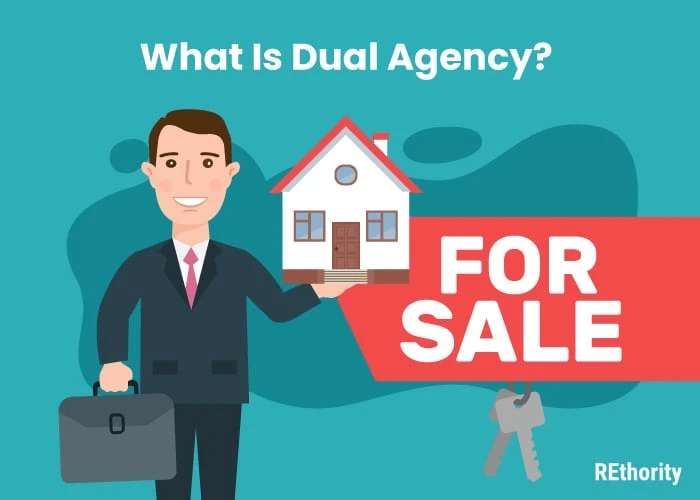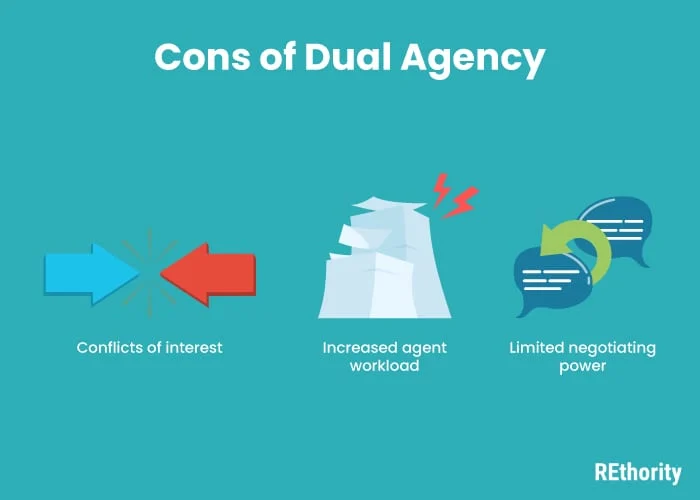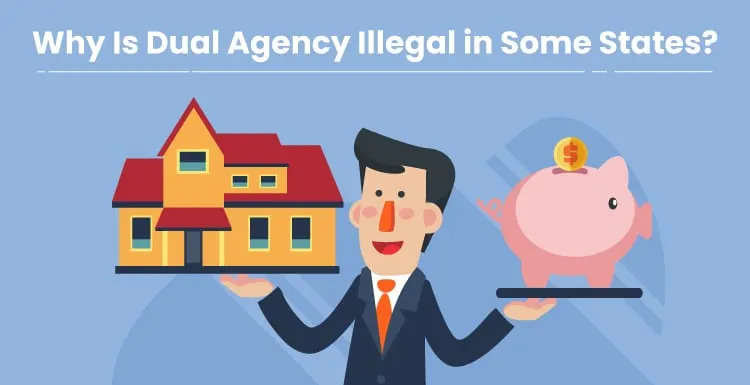There are two real estate agents in a typical real estate transaction: the listing agent and the selling agent. The listing agent represents the seller, and the selling agent represents the buyer.
But what happens when one agent represents both the buyer and the seller? “Double agents” aren’t limited to counterintelligence. In real estate, dual agents represent both parties in the transaction.
They keep the full commission rather than splitting it with the other party’s agent. It’s not as villainous as it sounds, but dual agency is illegal in some states (eight states, to be exact) because it can create a conflict of interest.
Let’s look at what constitutes dual agency, why it can be a problem, and the states in which it’s illegal.
What Is Dual Agency?

Dual agency occurs when a single real estate agent represents both parties in a real estate transaction: the seller and the buyer.
They act as both the listing agent and the selling agent simultaneously, which is called dual agency.
Because they are the only agents involved in the transaction, they earn both the listing agent commission and the selling agent commission, which would usually be split by two agents.
Another form of dual agency happens when two different agents represent the seller and buyer, but both agents work for the same brokerage. In this case, the agents will split the commission.
Dual agency isn’t very common, but situations occur when it’s hard to avoid. Next, we’ll talk about the most common dual-agency scenarios.
3 Common Dual Agency Scenarios

Dual agency tends to occur when a buyer is interested in a listing but doesn’t yet have an agent to represent them. It can also happen when a buyer’s own real estate agent represents a listing they want to purchase.
Or, when two agents from the same brokerage find themselves working as listing and selling agents in a transaction.
1. One Agent, Two Clients
If a listing agent represents a seller whose home meets a buyer’s criteria, this dual agency scenario can occur.
Example: George, a real estate agent, has two clients: Gina and Gilbert. He is Gina’s listing agent (she is selling her home). He is Gilbert’s selling agent (Gilbert wants to buy a house).
Gina’s house is exactly what Gilbert has been looking for, so George shows him the house. If Gilbert wants to buy it, George represents both parties in the transaction and acts as a dual agent.
2. Buyer Doesn’t Have an Agent
When a listing agent shows a home to a buyer who doesn’t have an agent, they may ask the listing agent to represent them. This results in dual agency (in states where it’s legal).
Example: George, the real estate agent, and his client, Gina, schedule an open house event to connect with potential buyers.
When Gilbert arrives and decides he wants to buy the house, he lets George know he doesn’t have an agent and wants him to act as his agent for the purchase. This makes George a dual agent, representing both the seller and the buyer.
3. Two Agents From the Same Brokerage
When a listing agent from a brokerage represents the seller and a selling agent from the same brokerage represents the buyer, this form of dual agency can occur.
Example: George, the real estate agent, is selling his client Gina’s house. Gillian, another agent at George’s brokerage, represents Gavin, who is buying Gina’s house.
Although there are two different agents involved in the transaction, both work for the same brokerage. This is considered a dual agency.
Benefits of Dual Agency

Dual agency can be advantageous in states where it is legal. Here are some of the ways an agent, buyer, or seller can benefit from dual agency.
Benefits for Agents
Dual agency can benefit agents by allowing them to have complete transparency in the process. They know the buyer’s side and the seller’s side.
This makes it easier to come to an agreement between the parties on offers, repairs, timelines, issues or special things about the home, etc.
Agents who represent both parties also have the obvious benefit of earning the full commission without needing to split it with another agent.
The average real estate agent commission is about 6%, usually split between the listing and selling agent. As the sole agent for both parties, a dual agent earns the full 6% commission.
A faster, more transparent closing process is another benefit for agents. Rather than waiting on a second agent to prepare documents, respond to offers, or consider negotiations, one agent can do it all and speed the transaction along.
Benefits for Sellers
Sellers benefit from dual agency by getting access to more information about the buyer and their needs. They may learn that the buyer isn’t going to budge from a certain condition (like having the seller cover closing costs) that can help speed the transaction up.
They may learn that the buyer would be willing to increase their offer if a few specific conditions were met. Sellers can also benefit from dual agency if they can negotiate a lower commission from the agent.
Because sellers typically cover the 6% commission out of the home’s total sale price, having one agent may give them room to negotiate for a lower commission.
Benefits for Buyers
Buyers can benefit from dual agency by getting access to more information about the home and the seller’s needs.
Instead of wasting time submitting offers lower than the seller will accept, a dual agent can let a buyer know that the seller has indicated they wouldn’t accept an offer below X amount.
Buyers can also benefit from dual agency by having a direct, friendly connection to the seller through the agent.
There’s a feeling of being on the same team rather than on opposing sides when the buyer and seller share an agent who is fair and neutral.
Why Dual Agency Can Be a Problem

A few scenarios make dual agency hard to avoid, and several benefits can be associated with it. So why is it illegal in some states?
What’s the problem with dual agency as long as both clients agree to it? Here are the potential problems dual agency can create.
Conflict of Interest
No matter how objective an agent tries to be, representing two clients in the same transaction leads to favoring one more than the other. Consciously or not, an agent may find themselves working harder for one party than the other.
They may be pressured to give confidential information to the buyer (such as the “magic” offer amount the seller will accept) that makes the transaction unfair. Any of these things creates a conflict of interest.
Increased Agent Workload
When an agent represents both parties in a real estate transaction, their workload literally doubles. They manage double the paperwork, meetings, negotiations, deadlines, and more.
It’s easy for things to slip through the cracks with this increased workload, and agents may find they are less effective or organized when acting as a dual agent.
Limited Negotiations
When a single agent represents both the buyer and the seller, there is little chance they will be able to negotiate on behalf of either party as effectively.
For example, if the inspection reveals a few repairs that need to be made, it’s difficult for a dual agent to represent both the buyer and seller fairly.
To fairly represent the buyer, the agent would need to negotiate that the seller cover the cost of needed repairs or make them before the purchase.
To fairly represent the seller, the agent would need to negotiate that the buyer cover those repairs themselves after purchase. How can the agent represent the best interests of both parties in a situation like this?
Dual Agency Is Illegal in Some States

Because of problems like those listed above, dual agency is not always looked upon favorably in real estate. Dual agency has resulted in lawsuits because either the buyer or seller didn’t feel the agent fairly represented them in the transaction.
In fact, several states have made the practice illegal. Dual agency is illegal in the following states:
- Alaska
- Colorado
- Florida
- Kansas
- Maryland
- Oklahoma
- Texas
- Vermont
In these states, an agent cannot represent both the buyer and the seller under any circumstance. Even in states where dual agency is legal, there are special rules and considerations. Disclosure is one of them.
When an agent represents both parties in a real estate transaction, they have to disclose this in writing before the transaction begins. Imagine finding out during closing that your agent also represents the seller.
You’d immediately wonder if that’s the real reason you weren’t able to negotiate a lower price for the house, or if that’s why your agent claimed the seller wasn’t open to making the needed repairs highlighted in the inspection.
Full disclosure is important, and so is neutrality. To represent both parties fairly, an agent has to be able to be completely neutral.
The Final Word on Dual Agency

Dual agency is illegal in some states because it creates a conflict of interest for both parties, doubles the agent’s workload, and makes fair negotiations next to impossible.
But that’s not to say it can’t be handled fairly in states where it remains legal. As long as a real estate agent can be neutral in the transaction, it’s possible for dual agency to be fair to both the buyer and the seller.
Full disclosure is the key to neutrality. Rather than pretending to be 100% in favor of both the buyer and seller, a dual agent should make it clear to both parties that they are working to ensure both end up with a fair deal.
If a seller needs to consider a lower offer (and it would be fair), the agent should encourage that.
If the buyer needs to agree to cover the cost of needed repairs because it’s a seller’s market (or another buyer’s offer is on the table), the agent should advocate for this.
Disclose, Disclose, Disclose
We’ll say it again: the best way to avoid getting into legal trouble when using dual agency is to disclose, disclose, disclose. Make it extremely clear (and in writing) that you’re representing both parties.
As we said above, it’s possible to neutrally represent both parties. But the key is that both parties must be represented. One can’t be favored over the other.
Dual agency is difficult to handle neutrally and professionally in states where it is legal, but it can be done with the right agent.
If you’re an agent considering dual agency, do your research first, dedicate yourself to disclosure and neutrality, and make sure your brokerage will agree to it.
If you’re a buyer or seller whose agent has disclosed dual agency, it’s worth learning as much as you can about how it works. In the end, the agent’s transparency and professionalism should be the deciding factor.

